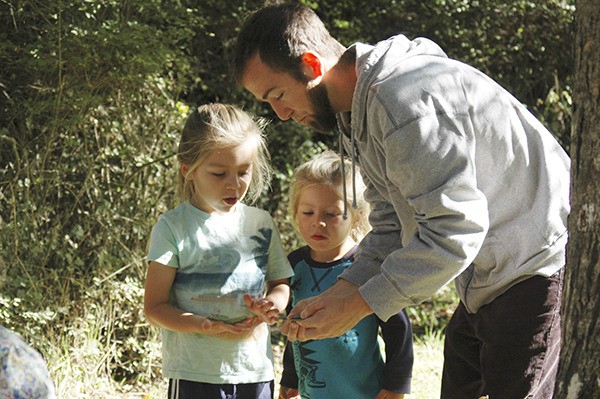Something as small as a raindrop to as large as a towering tree can inspire a learning opportunity at Owl’s Hollow Nature School.
“Everything we do blossoms from the forest,” Sarah Salazar-Tipton, executive director of Olympic Nature Experience, said. “I think there’s been a shift away from education in a traditional sense to experience.”
Although Owl’s Hollow Nature School is centered on providing a personalized free-flowing educational experience for children 3-6 years old, an underlying curriculum remains to help direct early learning in an all outdoor classroom setting.
The school operates under Olympic Nature Experience, a nonprofit that developed from the weekly outdoor children’s club (Dungeness Adventure Club) Salazar-Tipton spearheaded in 2012.
Supported by her innate appreciation and curiosity for nature and her own education in marine and environmental sciences, Olympic Nature Experience became one of few forest schools on the Olympic Peninsula last year.
Via the nonprofit, a variety of summer camps, the Dungeness Adventure Club and Owl’s Hollow Nature School continue to evolve.
Year two
Transitioning into its second year, Salazar-Tipton is excited to build and perfect the curriculum of Owl’s Hollow Nature School.
“We’re constantly refining,” she said. “The first day of our second year was such an amazing and exciting moment because it was no longer about how can we do it, but now it’s about how can we do it better.”
Utilizing parent input and observations from the previous year — year two of the school will have an even greater focus on building critical thinking skills while diving deeper into the existing knowledge base of returning students.
“This year we’re incorporating more nature skills, folklore and wisdom of our place,” Salazar-Tipton said. “Even at the pre-school level there is a lot of play that can go on and become educational.”
Accompanied by stories, songs and games, one of the unique techniques used to foster the students’ nature and critical thinking skills is tracking. By tracking elements, like raindrops, the size of the raindrops and why they may occur in one area but not another, can help a child better understand the world around them, make connections, build awareness and a sense of discovery, Salazar-Tipton explained.
“Tracking is more than just following footprints,” She said. “It’s a way of observing, hypothesizing and learning to follow clues.”
Another nature skill being folded into the curriculum is ethnobotany, such as teaching the students about native plants and wild edibles.
The outdoor classroom and associated physical activity allows for students to further develop their connection with nature, their emotional and social skills, but also their physical strength, Salazar-Tipton said.
“We really work with each child to help them discovery their own sense of strength, resilience and confidence,” she said.
Adjustments
Beginning mid-October, the school schedule will expand to three days per week to support the program’s growth and flexibility.
“It’s really important to me that we’re accessible to everyone,” Salazar-Tipton said.
To ensure this, Salazar-Tipton and staff are mindful to design the lessons so students may attend as many times a week as desired or doable.
“We’re always trying to create flexibility,” she said.
Expecting her third child, Salazar-Tipton is stepping back from her position as lead teacher to focus on her own family and on the overall sustainable development of Olympic Nature Experience. In preparation, Joshua Sylvester has taken on the role of lead teacher with Coral Burnaman as an assistant and Tamara Galvan as a substitute.
“I’m so excited to explore the park’s forests and meadows with the children this fall,” Sylvester said. “It’s amazing to watch their development through the year, as they make connections with the natural environment and each other.”
Applying his years of studying nature-based education on the East Coast and past experience teaching older students, Sylvester has worked with Salazar-Tipton to hone his teaching style to fit Owl’s Hollow Nature School.
“This age group brings a whole new dynamic and set of challenges, but it’s been an amazing experience,” he said.
Forest schools like Owl’s Hollow Nature School can widely vary, but certified forest school instructors “are trained how to keep children (and adults) safe in the woods and how to explore with them so they can delve into whatever topic may come up,” Salazar-Tipton said.
“Safety is our biggest goal,” she said. “Beyond that, it’s about getting the children to engage with nature.”



